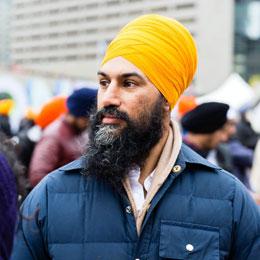Celebrating pride, remembering pain

By Mata Press Service
Pain and pride has enveloped the Sikh community in Canada as the month of November brings into focus the meaning behind the festival of Diwali, the anniversary of the 1984 Sikh-Hindu riots, the 550th birthday of Guru Nanak and the contribution of Sikhs in the military service.
“It will be a November to remember for us,” said Kirpal Sekhon, a Sikh businessman in Surrey.
Diwali or the festival of lights, which celebrates the triumph of light over darkness and good over evil falls on November 7 this year.
The story of Diwali, often associated with Hindu Goddess of fortune, Lakshmi, is celebrated by many faiths in India and in the South Asian diaspora.
For Sikhs, Diwali is particularly important because it celebrates the release from prison of the sixth guru, Guru Hargobind, and 52 other princes with him, in 1619.
“Diwali is celebrated for many reasons by different communities but when it comes every year, it is all about one people and one family,” said Sekhon.
“The festival has a unifying quality and that’s the true meaning of Diwali,” he said.
This month also marks the 34th anniversary of the anti-Sikh riots that broke out after the assassination of former Prime Minister Indira Gandhi in 1984 by her two Sikh bodyguards.
The trigger for Gandhi's killing was the storming of the Golden Temple in Amritsar city four months earlier to flush out Sikh militants fighting for an independent homeland of Khalistan.
Nearly 3,000 people were killed in the anti-Sikh riots that followed with rights activists accusing the Congress Party of having turned a blind eye while others say some of its leaders helped orchestrate the violence.
Jagmeet Singh, the federal New Democratic Party leader, who is aiming to secure a parliamentary seat in Burnaby, wants the House of Commons to recognize the carnage carried out by the fanatic Hindu mobs in November-1984 as genocide.
In a statement, he said;
“From November 1st to 4th, Canadians and Human Rights Advocates will mark the 34th anniversary of the 1984 Sikh Genocide.
Sikh men were burned alive. Women were subject to unthinkable sexual violence and children were murdered in gruesome fashion.
That is why I join and express my solidarity with the thousands of Canadians that live with this pain as survivors and bearers of intergenerational trauma.
By referring to the tragedy as “riots” the Liberal Government contradicted and undermined the spirit of reconciliation…the Ontario Legislature has recognized these atrocities as genocide.
It is my hope that the House of Commons in Canada and this government will do the same,” he said.
The Indian government sees this move as alarming evidence of Sikh extremism on Canadian soil.
Jagmeet’s statement comes in the wake of a campaign by the US-based group Sikhs for Justice (SFJ), with chapters in the U.K. and in Canada, with regards to reestablishing Punjab as a nation state.
Canada has reaffirmed its support for a united India as efforts get underway in several Canadian cities to hold polls as part of a part of SFJ’s worldwide referendum for an independent Sikh nation called Khalistan.
Remembrance Day this November, like in previous years, brings Sikhs together to recognize their long cultural tradition of participation in the military. Over 65,000 Sikhs fought for the British Army in WWI and over 300,000 Sikhs fought against the Germans and Japanese in WWII.
Across Canada, Sikh temples will be holding special ceremonies, said Harbinder Singh, a Vancouver-based newspaper publisher, who has been instrumental in fostering relationships between the Sikh community in BC and the Canadian Forces.
“It’s a solemn obligation to remember and be thankful for the sacrifices of our soldiers. We have to teach our kids that they must understand these core values as Canadians,” said Sewak, who helped found 3300 British Columbia Regiment of the Royal Canadian Army Cadet Corps – Canada’s first cadet corps – organized by the Sikh community.
Last week, the annual Sikh Remembrance Day Ceremony was held at the historic location of the grave of WWI Canadian hero Pvt. Buckam Singh, the only military grave in Canada of a Sikh soldier from the World Wars.
More than 200 members of the Canadian Armed Forces also gathered at a Sikh gurdwara in Scarborough last week, in what is believed to be the first-ever regimental Remembrance Day service to take place at a Sikh place of worship.
The ceremony celebrated Canadian soldiers, including Sikhs, who died in past wars, and recognized current service members.
The Government of India plans to commemorate the 550th birth anniversary of Guru Nanak Dev, the founder of Sikhism, with year-long events across the globe beginning November 23.
The US-based National Sikh Campaign (NSC) is working with Auteur Productions to produce an hour-long film focused on Guru Nanak’s life and his message to be released next year.
Guru Nanak was one of the greatest religious innovators of all time and the founder of the Sikh religion. The Guru’s religious ideas draw on both Hindu and Islamic thought but are far more than just a synthesis. Nanak was an original spiritual thinker and expressed his thoughts in extraordinary poetry that forms the basis of Sikh scripture.
Guru Nanak was born about 40 miles from Lahore (now in Pakistan) in 1469. The yearlong celebrations are expected to see hundreds of thousands of Sikhs visiting Guru Nanak’s birthplace called Sri Nankana Sahib.
Guru Nanak Dev-EcoSikh, an organization working for environmental issues across the world, has also planned to hold green celebrations in Pakistan.
“This event is going to be an inter-faith one as Guru Nanak Dev is not only the Guru of Sikhs but of entire humanity. Hindus, Muslims, and people from every community respect him,” the group said.









